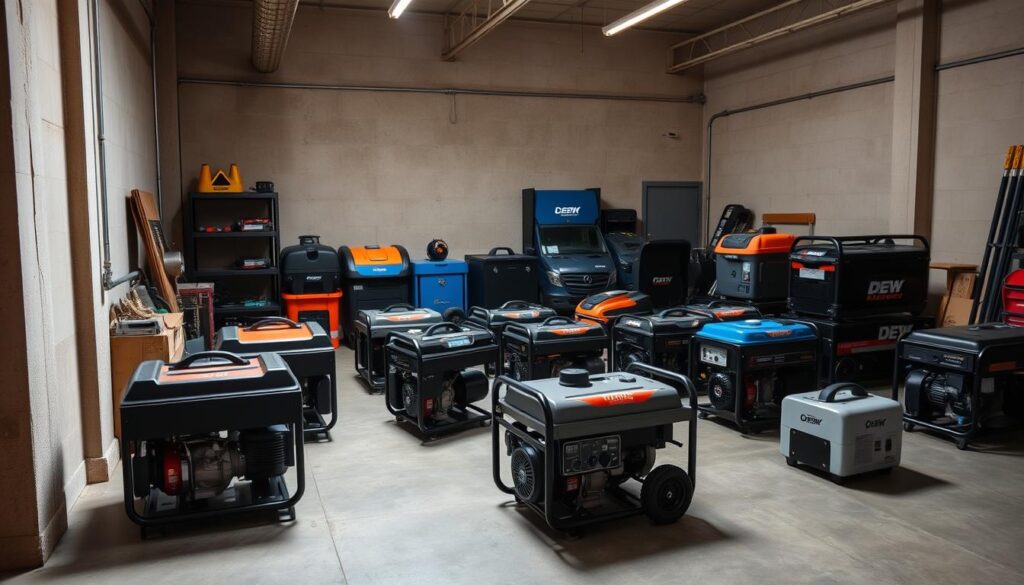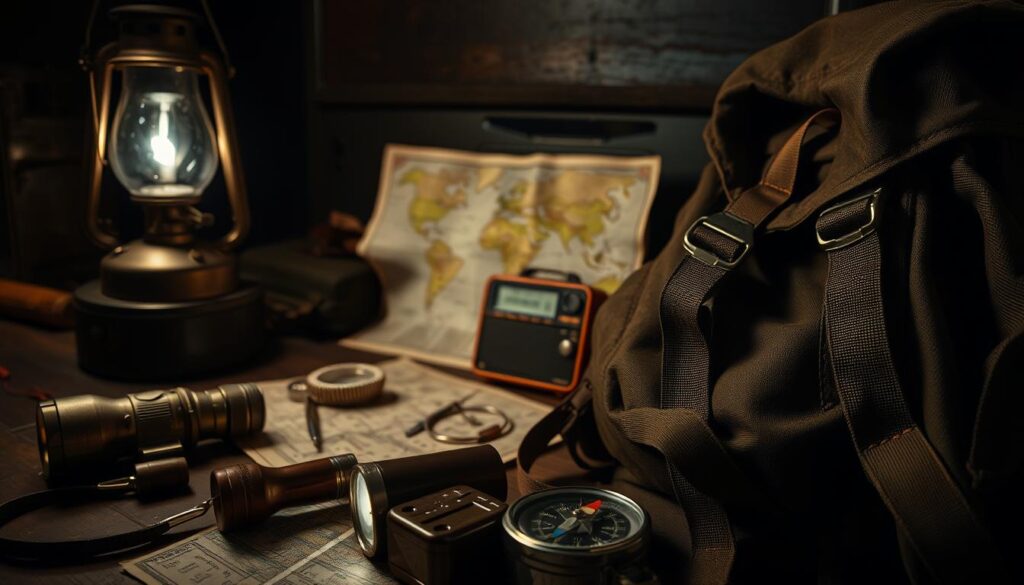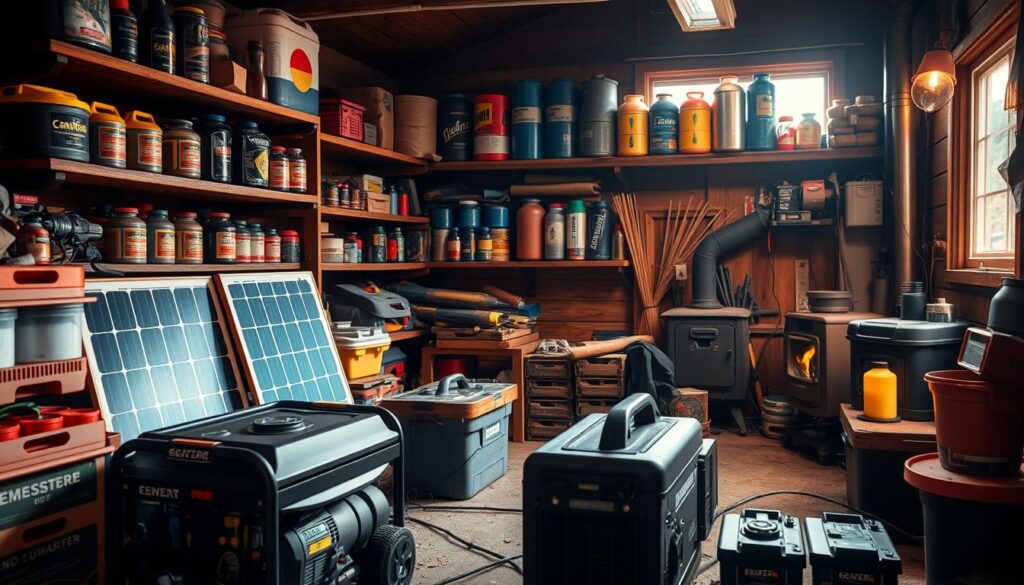Choosing the right power solution is key, more so in uncertain times. A good backup power source can be a game-changer.
Investing in a generator means you’re in charge of your power. With many types, prices, and sizes out there, picking the right one is important.
As an expert, I aim to help you through this. I want to make sure you find the perfect match for your needs.
Key Takeaways
- Understand the different types of power solutions available
- Consider your specific needs and circumstances
- Evaluate the pros and cons of various models
- Assess the importance of reliability and durability
- Make an informed decision based on expert advice
What is a Portable Generator?
A portable generator is a handy device that gives you electricity anywhere. It’s small and light, making it easy to carry around. It’s great for camping, working on sites, or when the power goes out.
Portable generators are super convenient for getting power when you need it. They’re perfect for home use, fun activities, and work. They let you keep using important tools and appliances without a hitch.
Definition and Purpose
A portable generator is a self-contained unit that’s easy to move and use. It’s meant to give you power when you can’t get it from the usual sources. It has an engine that makes electricity.
But it’s more than just power. It gives you freedom and reliability. For example, during disasters or power cuts, it can run your fridge, medical gear, and lights.
Common Uses
Portable generators are used in many ways, including:
- Camping and outdoor fun
- Home backup during outages
- Construction and work sites
- Emergency response and disaster relief
- Outdoor events and festivals
For instance, a portable generator for camping can power lights, cooking, and charging gadgets. A portable generator for home use keeps your home running during outages, keeping your family safe and cozy.
| Application | Typical Power Needs | Common Uses |
|---|---|---|
| Camping | 1,000 – 3,000 watts | Lighting, cooking, charging devices |
| Home Backup | 3,000 – 10,000 watts | Refrigeration, lighting, medical equipment |
| Construction Sites | 5,000 – 15,000 watts | Power tools, lighting, equipment |
Knowing how portable generators are used helps you pick the right one. Whether for fun or as a backup, there’s a generator for your needs.
Types of Portable Generators
Portable generators come in different types, each with its own purpose and benefits. Knowing these differences helps you pick the right one for your needs.
Inverter vs. Conventional
Inverter generators are great for sensitive electronics because they produce clean energy. They are also more fuel-efficient and quieter than traditional generators.
Key advantages of inverter generators include:
- Fuel efficiency
- Quiet operation
- Clean energy output
Conventional generators, though, are more powerful and can handle heavy loads. But they might not be as fuel-efficient or quiet as inverter generators.
Dual-Fuel Generators
Dual-fuel generators can run on gasoline or propane. This flexibility is useful in many situations.
The benefits of dual-fuel generators include:
- Flexibility in fuel choice
- Potential cost savings
- Extended runtime
Solar Generators
Solar generators use solar energy to power up. They’re perfect for outdoor fun and emergencies when you can’t use traditional fuels.
Advantages of solar generators:
- Environmentally friendly
- Zero operating costs
- Silent operation
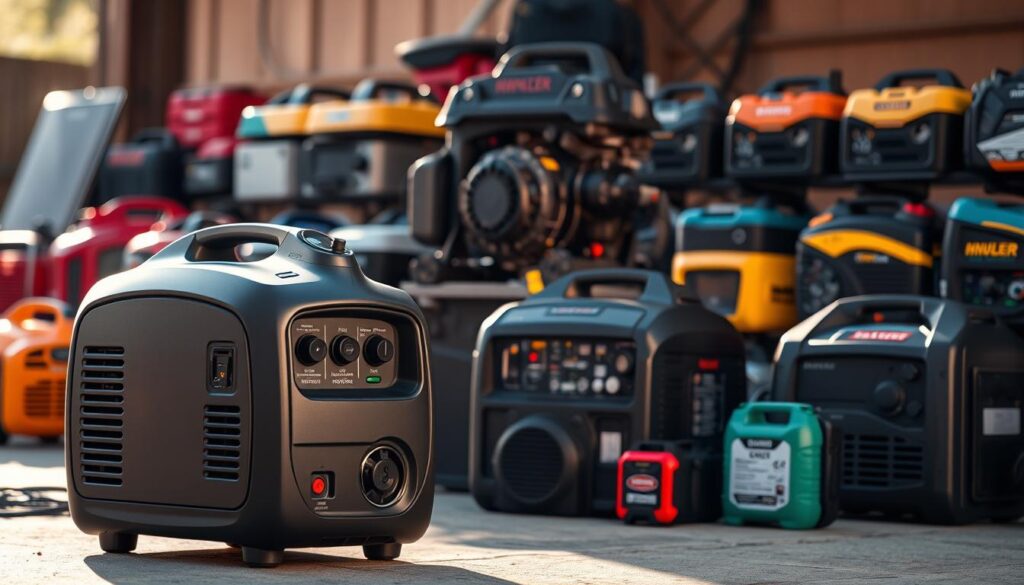
Choosing the right portable generator depends on your needs. Whether it’s for fun, emergencies, or work, understanding each type helps you make the best choice.
Key Features to Consider
Choosing the right portable generator is all about looking at key features. These features affect how well the generator works and how easy it is to use. When I’m searching for a portable generator, I focus on a few important traits.
Starting and Running Watts
The wattage output is a big deal. Starting watts are what you need to start an appliance. Running watts are what keep it running. You must figure out the wattage of each appliance you’ll power at once.
It’s smart to choose a generator with 20 to 30 percent more power than you need. This extra power helps with unexpected loads or spikes.
Fuel Type and Efficiency
The fuel type and efficiency of a portable generator matter a lot. Generators can use gasoline, propane, or diesel. Your choice depends on what’s available, the cost, and what you prefer.
Fuel efficiency is key too. It tells you how long the generator will run on one tank. I always look for generators that use fuel well. This helps save money and means you don’t have to refuel as often.
Noise Level and Portability
For many, noise level and portability are big factors. A quiet generator is great for camping or home use, where you don’t want to disturb anyone. Look for generators with features to reduce noise or those made to be quiet.
Also, think about the generator’s weight and design. It should be easy to carry. Look for generators with handles or wheels to make moving them easier.
In short, when picking a portable generator, think about starting and running watts, fuel type and efficiency, and noise level and portability. Focusing on these features helps you find a generator that works well and gives you reliable power when you need it.
Understanding Wattage Needs
Figuring out your wattage needs is key to picking the right portable generator. You need to think about the power each appliance you plan to use needs.
First, list the must-have appliances for when the power goes out. This might include lights, fridges, medical gear, or air conditioners. Each has a specific wattage, found on the device or in its manual.
Calculating Your Power Requirements
To find your total power needs, add up the wattage of all appliances you’ll use at once. It’s important to know the difference between starting and running watts. Some devices need a lot of power to start up.
For example, a fridge might use 600 watts to run but 1800 watts to start. A generator wattage calculator can help make this easier and more accurate.
Essential Appliances and Their Wattage
Here’s a quick guide to the wattage needs of some common appliances:
| Appliance | Running Watts | Starting Watts |
|---|---|---|
| LED Light Bulb | 9 | 9 |
| Refrigerator | 600 | 1800 |
| Laptop | 50 | 50 |
| Air Conditioner (10,000 BTU) | 1200 | 1800 |
Knowing the wattage needs of your essential appliances helps you pick the right portable generator. This ensures you have power when you need it most.
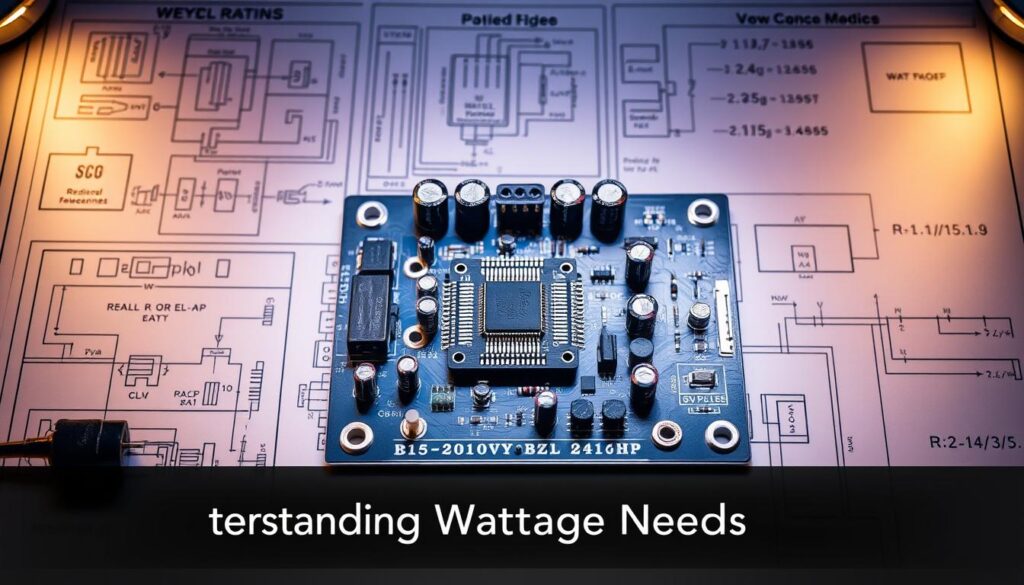
Safety Features to Look For
When picking a portable generator, safety features are key. They help avoid accidents and ensure the generator works well. These features protect both the user and the equipment from harm.
Automatic Shutdown
Automatic shutdown is a must-have. It lets the generator stop itself if there’s a problem, like low oil or too much load. This prevents damage and keeps you safe.
Ground Fault Circuit Interrupters (GFCI)
Ground Fault Circuit Interrupters (GFCI) are also critical. They stop electrical shock by finding ground faults and cutting off power. This is very important in wet places or near water.
Overload Protection
Overload protection is essential too. It stops the generator from being too full, which can cause damage or fires. This protection might use circuit breakers or other systems to cut power when needed.
In short, when you’re choosing a portable generator, look for these safety features. They make sure your generator is safe and works right. Knowing and choosing these features helps avoid risks when using a generator.
Top Brands in the Portable Generator Market
Several top brands lead the portable generator market. They are known for their quality and reliability. These brands have earned their reputation through consistent performance and customer satisfaction.
Honda Generators are at the top for their durability and efficiency. They are a favorite among homeowners and professionals. This is because of their reliability and how well they use fuel.
Honda Generators
Honda generators are famous for their high-quality engines and new technology. They have a variety of models. From small, light units to big ones that can handle heavy loads.
Yamaha Generators
Yamaha Generators are also a top pick. They have high-performance engines and advanced features like inverter technology. Yamaha generators are quiet and use fuel well, making them great for many uses.
Generac Generators
Generac Generators are well-respected in the industry. They offer many portable generators with different power levels. Generac generators are known for being strong and reliable.
These top brands – Honda, Yamaha, and Generac – always provide high-quality portable generators. They meet the needs of many users. Choosing one of these brands means you get a reliable and efficient power solution.
Maintenance Tips for Portable Generators
Keeping your portable generator in top shape is key. Regular care makes sure it’s ready when you need it. It also saves you from expensive fixes later on.
Regular Oil Changes
Changing the oil is a must for your portable generator. The oil keeps the engine’s parts moving smoothly. Change the oil after the first 20 hours and then every 50 hours after that. Always check your generator’s manual for the right oil.
Tip: Keeping a log of your maintenance can help you remember when to change the oil and do other tasks.
Cleaning Air Filters
A clean air filter is vital for your generator’s health. It stops dust and dirt from getting into the engine. This keeps it running well and saves fuel. Clean or replace the air filter every 25 hours of use.
Remember, a clean air filter is essential for your generator’s best performance.
Storage Best Practices
Storing your portable generator right is important. Keep it in a dry, well-ventilated spot, out of the sun. Make sure it’s cool before storing, and use a cover to keep dust off. For long storage, drain the fuel tank or use a fuel stabilizer to keep the fuel fresh.
“Proper storage and maintenance can significantly extend the life of your portable generator.”
By following these tips, your portable generator will stay in great shape. It will be ready to power your needs whenever you need it.
Troubleshooting Common Issues
Learning to fix common problems with your portable generator can save you time and improve its performance. You might face issues like starting problems, power supply issues, or fuel system problems. A step-by-step approach can help you find and solve these problems.
Starting Problems
Starting problems can be annoying, but they’re often easy to solve. Make sure your generator is well-maintained, with enough oil and a clean air filter. If it won’t start, check the spark plug for damage or fouling.
A bad spark plug can stop the engine from starting. Also, check that the choke is working right and the fuel valve is open. For recoil starters, look for blockages or wear. For electric start models, ensure the battery is charged and connections are clean.
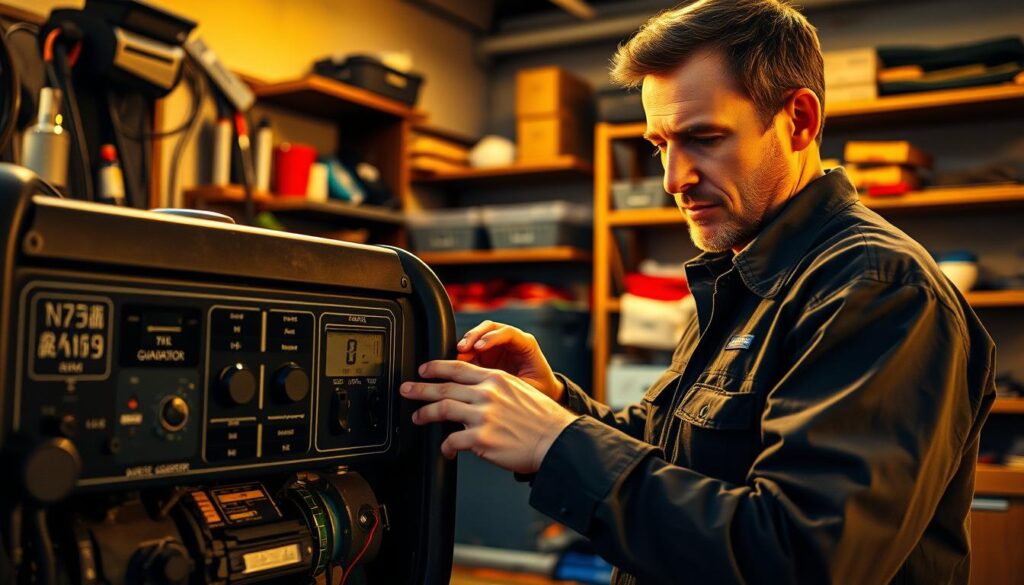
Inconsistent Power Supply
Power supply issues can stem from several causes, like wrong load management, faulty voltage regulators, or AVR problems. First, make sure you’re not overloading the generator. The total power of appliances should not go over the generator’s rated capacity.
If it’s not overloading, look at the voltage regulator and AVR for any problems. A bad voltage regulator can lead to voltage fluctuations, which can harm your equipment.
Fuel System Issues
Fuel system problems can show up as not starting, poor performance, or stalling. They might be due to clogged fuel filters, bad fuel, or carburetor issues. Start by checking the fuel level and making sure the fuel valve is open. Look for blockages in the fuel filter and replace it if needed.
If the fuel system keeps failing, check the carburetor for dirt or varnish. Cleaning or rebuilding the carburetor might fix it. Also, avoid using old or dirty fuel; always use fresh, clean fuel.
By tackling these common problems step by step, you can usually get your portable generator working again without professional help.
Portable Generators vs. Standby Generators
When choosing a backup power solution, you have two main options: portable generators and standby generators. Each has its own benefits and drawbacks. Your choice depends on how much power you need, how often you’ll use it, and your budget.
Portable generators are flexible and affordable. They’re great for camping or when the power goes out. Standby generators, on the other hand, are fixed in place. They start automatically when the power fails, making the switch smooth.
Cost Considerations
The cost is a big factor in choosing between portable and standby generators. Portable generators are generally cheaper to buy, with prices from a few hundred to several thousand dollars. Standby generators cost more, both to buy and to install, adding thousands to the total price.
To learn more about the cost differences, check out this resource. It offers a detailed comparison.
Installation Requirements
Installation is another key consideration. Portable generators are easy to set up, needing only basic steps to start. Standby generators, though, require professional installation. This includes connecting to your home’s electrical panel and installing a transfer switch. This adds to the cost and must follow local electrical codes.
Use Cases
The type of generator you choose also depends on how you plan to use it. Portable generators are versatile, good for outdoor events, construction sites, or temporary power needs. Standby generators are best for homes or businesses needing a reliable, automatic backup during outages.
In summary, while both portable and standby generators have their benefits, your decision should be based on your specific needs. Consider the cost, installation, and how you plan to use the generator.
Legal and Regulatory Considerations
It’s important to know the legal rules for using portable generators. Local laws are key in figuring out where and how you can use them.
Local Codes and Regulations
Local rules change a lot from place to place. You need to talk to your local government to find out what’s needed in your area. Some places have strict rules about noise, while others might have special rules for using generators at home.
Key Areas to Check:
- Noise Ordinances
- Emission Standards
- Usage in Residential Areas
Here’s a table with some common local rules:
| Regulation Type | Description | Example |
|---|---|---|
| Noise Ordinances | Rules governing the acceptable noise levels | Generators must not exceed 60 dB |
| Emission Standards | Standards for emissions to reduce environmental impact | Compliance with EPA standards |
| Residential Use | Regulations on using generators in residential areas | Prohibited in certain neighborhoods |
Permits for Use
Getting the right permits is also important. Some places need permits for portable generators, like on construction sites or for a long time. You should check with your local building department or permitting office to see what you need.
Following these rules helps keep your portable generator safe and legal. Not following them can lead to fines or other penalties. So, it’s really important to get it right.
Environment and Sustainability
Portable generators play a big role in our lives, but we must think about their impact on the environment. The growing need for these devices has raised worries about their sustainability and environmental effects.
One important thing to consider is the emission standards for portable generators. Emission standards help reduce the environmental impact of these generators. The U.S. Environmental Protection Agency (EPA) sets these standards to limit pollutants in the air.
Emissions and Noise
Portable generators release pollutants like carbon monoxide and nitrogen oxides. The EPA has emission standards that sort generators into tiers based on emissions. It’s key to choose a generator that meets or beats these standards.
Another important factor is noise regulations. Generators can be noisy, which can disturb people, even in quiet areas. Many makers now make quieter generators, fitting them for more uses.
Eco-Friendly Alternatives
If you’re worried about the environment, there are eco-friendly options out there. Some of the latest trends include:
- Solar-powered generators, a green alternative to traditional ones.
- Hybrid generators, which use different power sources to cut emissions and boost efficiency.
- Inverter generators, which give cleaner power and are often more fuel-efficient.
Studies show that sustainable hybrid solutions are getting more popular. They offer lower costs and longer life for assets. As tech advances, we’ll see even more green options in the market.
Thinking about the environmental and sustainability aspects of portable generators helps us make better choices. We can find generators that meet our needs while helping the planet stay clean and healthy.
Conclusion and Final Thoughts
Choosing the right portable generator is important. You need to think about how much power you need, the type of fuel, safety features, and the brand’s reputation. Knowing these things helps you make a good choice that fits your needs.
Key Takeaways
When picking a portable generator, first figure out how much power you need. Then, look at the features that are important to you. It’s also good to check out brands like Honda, Yamaha, and Generac. Remember, keeping your generator in good shape is key to its long life and performance.
Encouragement to Research Further
I suggest you do more research on portable generators. Look at the newest models and read what other users have to say. This way, you’ll know about the latest technology and find the best generator for your needs. It could be for camping, as a backup power source, or for outdoor events.
FAQ
What is the best portable generator for home use?
The best portable generator for home use varies based on your needs. Top brands like Honda, Yamaha, and Generac are reliable. Look at starting and running watts, fuel efficiency, and noise level when choosing.
How do I calculate my power requirements for a portable generator?
First, list the appliances you want to power and their wattage. Then, add up their wattage and consider extra capacity for surge loads. This will help you find the right generator.
What safety features should I look for in a portable generator?
Look for automatic shutdown, Ground Fault Circuit Interrupters (GFCI), and overload protection. These features prevent accidents and ensure safe use.
Can I use a portable generator for camping or recreational activities?
Yes, portable generators are great for camping, RVing, and other activities. They power lights, refrigerators, and more. Choose low noise and compact designs for easy transport.
How do I maintain my portable generator?
Regular maintenance is key for your generator’s life and performance. This includes oil changes, cleaning air filters, and proper storage. Always follow your owner’s manual for maintenance tips.
What is the difference between a portable generator and a standby generator?
Portable generators are for temporary or emergency power. Standby generators are installed permanently and provide power during outages. Standby generators are more expensive and need professional installation.
Are there any environmental or sustainability concerns with portable generators?
Yes, portable generators can harm the environment with emissions and noise. Look for generators with emission-reducing technologies. Consider eco-friendly options like solar generators too.
Can I use a portable generator in my neighborhood, or are there local regulations?
Local rules may limit portable generator use in some areas. Check with your local authorities to see if there are specific requirements or permits needed.
How do I troubleshoot common issues with my portable generator?
To troubleshoot, check the fuel system, spark plug, and air filter. If unsure, consult your owner’s manual or contact a professional.
What are the benefits of using an inverter generator?
Inverter generators offer cleaner power, better fuel efficiency, and lower noise. They’re perfect for sensitive electronics and reliable for camping, RVing, or home backup.

